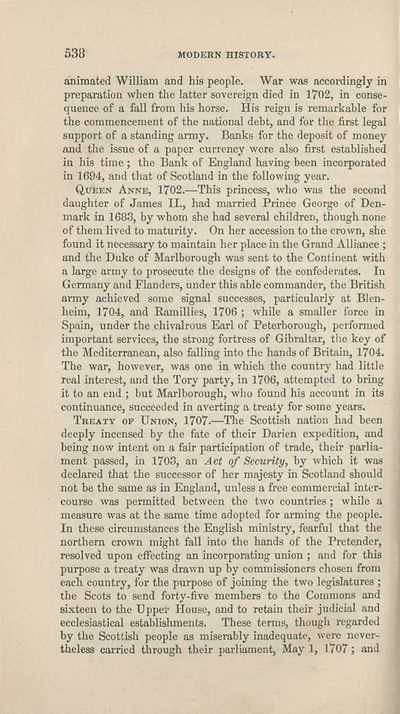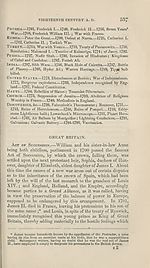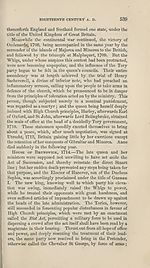Download files
Complete book:
Individual page:
Thumbnail gallery: Grid view | List view

538
MODERN HISTORY.
animated William and his people. War was accordingly in
preparation when the latter sovereign died in 1702, in conse¬
quence of a fall from his horse. His reign is remarkable for
the commencement of the national debt, and for the first legal
support of a standing army. Banks for the deposit of money
and the issue of a paper currency were also first established
in his time ; the Bank of England having been incorporated
in 1694, and that of Scotland in the following year.
Queen Anne, 1702.—This princess, who was the second
daughter of James II., had married Prince George of Den¬
mark in 1683, by whom she had several children, though none
of them lived to maturity. On her accession to the crown, she
found it necessary to maintain her place in the Grand Alliance ;
and the Duke of Marlborough was sent to the Continent with
a large army to prosecute the designs of the confederates. In
Germany and Flanders, under this able commander, the British
army achieved some signal successes, particularly at Blen¬
heim, 1704, and Ramillies, 1706 ; while a smaller force in
Spain, under the chivalrous Earl of Peterborough, performed
important services, the strong fortress of Gibraltar, the key of
the Mediterranean, also falling into the hands of Britain, l704.
The war, however, was one in which the country had little
real interest, and the Tory party, in 1706, attempted to bring
it to an end ; but Marlborough, who found his account in its
continuance, succeeded in averting a treaty for some years.
Treaty op Union, 1707.—The Scottish nation had been
deeply incensed by the fate of their Darien expedition, and
being now intent on a fair participation of trade, their parlia- j
ment passed, in 1703, an Act of Security, by which it was
declared that the successor of her majesty in Scotland should j
not he the same as in England, unless a free commercial inter- J
course was permitted between the two countries; while a ,
measure was at the same time adopted for arming the people. '
In these circumstances the English ministry, fearful that the
northern crown might fall into the hands of the Pretender,
resolved upon effecting an incorporating union ; and for this
purpose a treaty was drawn up by commissioners chosen from
each country, for the purpose of joining the two legislatures ;
the Scots to send forty-five members to the Commons and
sixteen to the Upper House, and to retain their judicial and
ecclesiastical establishments. These terms, though regarded j
by the Scottish people as miserably inadequate, were never¬
theless carried through their parliament, May 1, 1707; and
MODERN HISTORY.
animated William and his people. War was accordingly in
preparation when the latter sovereign died in 1702, in conse¬
quence of a fall from his horse. His reign is remarkable for
the commencement of the national debt, and for the first legal
support of a standing army. Banks for the deposit of money
and the issue of a paper currency were also first established
in his time ; the Bank of England having been incorporated
in 1694, and that of Scotland in the following year.
Queen Anne, 1702.—This princess, who was the second
daughter of James II., had married Prince George of Den¬
mark in 1683, by whom she had several children, though none
of them lived to maturity. On her accession to the crown, she
found it necessary to maintain her place in the Grand Alliance ;
and the Duke of Marlborough was sent to the Continent with
a large army to prosecute the designs of the confederates. In
Germany and Flanders, under this able commander, the British
army achieved some signal successes, particularly at Blen¬
heim, 1704, and Ramillies, 1706 ; while a smaller force in
Spain, under the chivalrous Earl of Peterborough, performed
important services, the strong fortress of Gibraltar, the key of
the Mediterranean, also falling into the hands of Britain, l704.
The war, however, was one in which the country had little
real interest, and the Tory party, in 1706, attempted to bring
it to an end ; but Marlborough, who found his account in its
continuance, succeeded in averting a treaty for some years.
Treaty op Union, 1707.—The Scottish nation had been
deeply incensed by the fate of their Darien expedition, and
being now intent on a fair participation of trade, their parlia- j
ment passed, in 1703, an Act of Security, by which it was
declared that the successor of her majesty in Scotland should j
not he the same as in England, unless a free commercial inter- J
course was permitted between the two countries; while a ,
measure was at the same time adopted for arming the people. '
In these circumstances the English ministry, fearful that the
northern crown might fall into the hands of the Pretender,
resolved upon effecting an incorporating union ; and for this
purpose a treaty was drawn up by commissioners chosen from
each country, for the purpose of joining the two legislatures ;
the Scots to send forty-five members to the Commons and
sixteen to the Upper House, and to retain their judicial and
ecclesiastical establishments. These terms, though regarded j
by the Scottish people as miserably inadequate, were never¬
theless carried through their parliament, May 1, 1707; and
Set display mode to:
![]() Universal Viewer |
Universal Viewer | ![]() Mirador |
Large image | Transcription
Mirador |
Large image | Transcription
| Antiquarian books of Scotland > Education > Elements of universal history on a new and systematic plan > (558) |
|---|
| Permanent URL | https://digital.nls.uk/127586836 |
|---|
| Description | Thousands of printed books from the Antiquarian Books of Scotland collection which dates from 1641 to the 1980s. The collection consists of 14,800 books which were published in Scotland or have a Scottish connection, e.g. through the author, printer or owner. Subjects covered include sport, education, diseases, adventure, occupations, Jacobites, politics and religion. Among the 29 languages represented are English, Gaelic, Italian, French, Russian and Swedish. |
|---|

